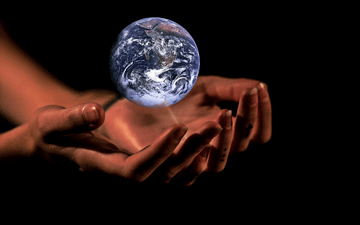
Paul J. Schutz, is an assistant professor of religious studies at Santa Clara University. Thoughts are his own.
In his famous 1967 essay, “The Historical Roots of Our Ecologic Crisis,” historian Lynn White, Jr., writes, “What we do about ecology depends on our ideas of the man-nature relationship.”
I could comment on many aspects of White’s argument, as many scholars have done in the 50 years since he indicted the Christian tradition for causing the ecological crisis. But for this short piece, I simply want to lift up the emphasis White places on action. He doesn’t only speak about what we think or believe. He is concerned foremost with what we humans do—how we live our social and ecological relationships in a time of increasing planetary peril.
Yet as White states, the way we choose to live our relationship to the earth and other-than-human creatures—and the ethical question of how we should live that relationship—depends on how we see and imagine reality.
Without a doubt, humans possess the most sophisticated brains in the universe (at least as we know it!). Our gray matter developed over millions of years of evolutionary history, leading to the emergence of a unique capacity for self-conscious reflection and ethical decision making. But does the fact of our evolutionary development mean that we have greater value than other creatures, such that we can exploit trees, water, oil, and even animal species for the supposed benefit of human ends? Or should the fact that we can make ethical decisions promote greater mindfulness and a wider sense of responsibility for the well-being of all creatures, with whom we live and on whom we depend? (In classes, I call the latter idea the Spider-Man Principle: “With great power comes great responsibility.”)
The first, exploitative version of human-earth relations is typically known as anthropocentrism. Anthropocentrism is a worldview centered on humanity: human interests, the growth of human societies and the expansion of economies, and so on. Within an anthropocentric framework, what we do is determined by what serves human (typically white, male, Western human) interests. On White’s account—citing the language of Genesis to “have dominion” over the land and its creatures—Christianity is “the most anthropocentric religion the world has ever seen.” But is it necessarily so?
Historically, Christian teaching has been deployed to anthropocentric ends, co-opting the language of dominion found in Genesis 1 to authorize the imperial and colonial exploitation of lands and peoples. But by engaging with the sciences, contemporary ecological theology proposes a new paradigm for human-earth relations: a new way of seeing and imagining creation in the light of our dependence on plants and animals and the evolutionary history we share with them.
For example, we frequently hear that we need bees to pollinate our crops and trees to produce breathable air—and that is certainly so. We need healthy ecological processes that can keep water clean and soil fertile; these processes depend on the contributions of myriad creations: bacteria, flora, and fauna, which keep things running smoothly.
But while we need these creatures, they don’t need us. In fact, they’d get along just fine without us! But anthropocentrism eclipses our awareness of dependence on other creatures, seeing them as little more than “resources” for our consumption, devoid of value on their own. Yet as our present ecological crisis shows, unchecked consumption disrupts and, in many cases, destroys the vital life systems that make human life possible.
We must come to see other-than-human creatures in terms of their vital contributions to the total ecological life-system that supports and sustains creatures of all types and stripes.
To this end, contemporary Christian theology has moved toward a different vision of creation centered on the fundamental dependence of all creatures on the lifegiving God, the author of our evolutionary history. Seen through the lens of this new ecological imaginary (which really isn’t new, but dates to earlier periods of Christian history), creation is a vast community of life, held in being and nourished by the Creator.
Seeing creation in this way decenters human interests and so replaces anthropocentrism with a robust ecocentrism that finds value in the lifegiving ecological and social relationships creatures share with one another. In other words, rather than focusing on what one species needs—and humans have been around for only 1% of 1% of cosmic history!—such a vision focuses on how creatures contribute in great and small ways to the socioecological contexts they share.
If White is correct that what we do—our ethics—depends on how we see, then such a vision of creation should produce new ways of relating and acting. It should guide us toward decisions that benefit the whole and that produce the greatest life, flourishing, and communion among all the good creatures God has made. To my mind, this vision is a source of great hope. But hope must be realized in word and deed, for the good of the palms and squirrels, of rocks, rivers, and redwoods, as each contributes in its own way to the great system of life—the gift of the Creator we call “Earth.”
